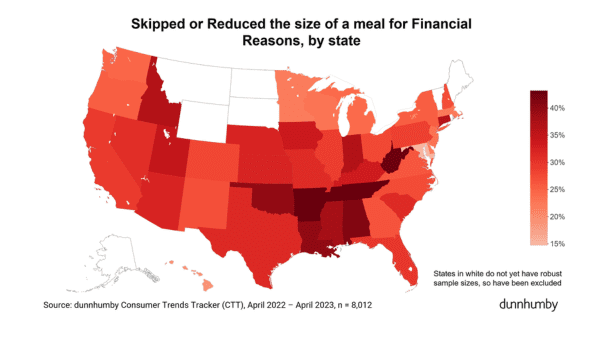A new report by the market research firm Dunnhumby has received some attention recently.
Particularly its figures indicating the percentage of households that have skipped or reduced a meal for financial reasons over the last 12 months.

The report says, “Over the last year, families with children at home have struggled more than the U.S. average. As high as 72% would have difficulty covering an unexpected expense of $400, and 36% of families have skipped or cut the size of their meals for financial reasons. Those in the age group of 18-44 are the hardest hit, in terms of financial and food insecurity.”
The 36 percent figure is for families with children. The percentage was slightly lower overall—just over 30 percent for all U.S. households.
The worst-off states are Arkansas, Tennessee, and West Virginia, where over 40 percent of households surveyed have had to skip meals, “which should serve as a warning for retailers operating in this region to double down on providing value to their customers.”
The report also noted a wide discrepancy between the public perception of food inflation and the actuality. It’s pretty big: The perceived rate is 22.6 percent, whereas figures from the federal Bureau of Labor Statistics indicate that it was actually 7.1 percent.
The report also broke down the relative importance of price and quality for a number of grocery categories. “Food-insecure” households naturally found price more important than ordinary ones, although the two groups showed a general correlation among categories.
For both, seafood was the category where quality mattered the most in relation to price. Number two was fresh produce, followed by meats.
Another finding: “Ordering online for delivery has grown by 9% YoY [year over year] and ordering online for pick-up by 5% YoY.” But percentages of online sales for delivery or pickup remain in the 20-30 percent range.
The report mentions the well-known fact that food-insecure homes are also the ones most subject to time pressure, which would make them more likely to buy prepared foods as well as fast foods.
The report is fascinating but leaves some questions unanswered.
The most important one is, which meals are these families skipping? Home-prepared meals, fast-food meals, ready-made meals?
Time pressure would suggest that home-prepared meals are the ones most likely to be missed (“I had to work an extra hour today, and I just can’t get anything together”). Which would also be the meals that are most likely to offer fresh fruits and vegetables.
The Dunnhumby study focuses on retail grocery, so it doesn’t answer questions of this sort. But they are precisely the ones that the produce industry would most benefit from knowing.



